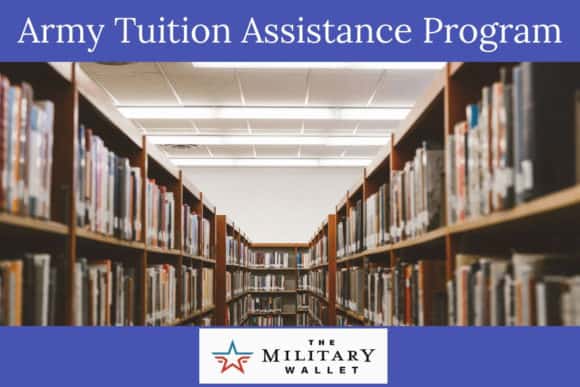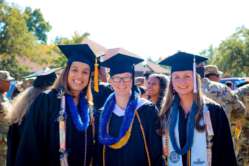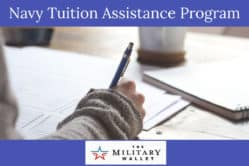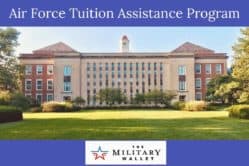Table of Contents

The Army Tuition Assistance (TA) program provides tuition for eligible Soldiers to help them achieve their educational goals.
However, Soldiers must first meet stringent criteria to be eligible to participate in the TA program.
Let’s dive in and look at what the Army TA program offers, who is eligible, which educational programs are covered, and how to take advantage of this valuable benefit.
Army Tuition Assistance Benefits
The Department of Defense authorizes military branches to provide Tuition Assistance benefits of up to $250 per semester hour of credit. However, each branch can specify its standards within these limitations. The Army, for example, will fund 100% of the tuition for up to 16 hours of credit, not exceeding $250 per credit hour (up to $4,000 per fiscal year).
What Does the Army Tuition Assistance Program Cover?
TA covers tuition only. TA will not pay for fees institutions levy unless authorized by DoD Instruction 1322.25.
This means the Army does not pay certain fees, including laboratory fees, course fees, some administrative fees, books, and other fees.
Army Tuition Assistance Eligibility
To be eligible for TA benefits, Soldiers must be on active duty.
Before obtaining Tuition Assistance, Soldiers must contact their Education Services Specialist or visit an Education Center to declare an educational goal and create an educational plan.
The following also may apply:
- Soldiers can use TA for up to 130 SH for a bachelor’s degree and up to 39 SH for a master’s degree.
- The 39-semester hour limit applies to all credits taken after completing a baccalaureate degree.
- Soldiers can’t use TA to pursue a second bachelor’s degree or doctoral degree, nor can they double up and request TA while on orders in a fully funded degree program.
- TA funds cannot be used for placement exams, competency tests, or evaluation for past experience.
- As other fully funded programs are available for first professional degrees (PHD, MD, JD), TA is not designed for this purpose.
- To be eligible for TA, Soldiers must meet Army physical fitness test (APFT) and height/weight standards and not have a DA adverse action flag.
- TA requests must be submitted and approved prior to the first class date, without exception.
- Reimbursement will be required from the servicemember if a successful course completion is not obtained.
Time in Service and Additional Service Commitments
Any enlisted Soldier using TA must have enough time left in service to complete the courses they are signing up for.
By law, officers who use TA incur a service obligation.
- Active Duty officers incur an Active Duty Service Obligation (ADSO) of two years, and
- Reserve Component officers incur a Reserve Duty Service Obligation (RDSO) of four years.
- The ADSO/RDSO is calculated from the date of completion of the last course for which TA was used.
Eligible Study Programs
Army Tuition Assistance is available for online courses, by correspondence, or other non-traditional means. The courses must be offered by colleges accredited by accrediting agencies recognized by the U.S. Department of Education.
Professional degrees such as a Ph.D., MD, or JD were listed as ineligible for the Army Tuition Assistance program. However, these degrees are required for hard-to-fill billets and are almost always in high demand.
There are special programs to help Soldiers achieve these degrees. See your Education and Training Office for more information regarding eligible study programs and schools.
Alternative Ways to Pay for College
Army Soldiers who aren’t eligible for the Tuition Assistance program still have options to continue their education while serving.
For example, the DoD offers military members the opportunity to take credit by examination tests, including the CLEP and DANTES tests.
Passing these test gives students college credits at a variety of colleges and universities. They can be a great way to reduce the time needed to achieve a degree. I used these extensively while taking classes on active duty. Many colleges and universities also offer credits for military service.
Other ways to pay for college include the Montgomery GI Bill, the Post-9/11 GI Bill, military scholarships, federal grants, grants and scholarships from schools, and other tuition assistance programs.
With a little planning, achieving a Bachelor’s Degree with little to no out-of-pocket expense may be possible without using the Army TA program. This would allow enlisted members to complete a Bachelor’s Degree and then begin working on a post-bachelor’s degree without waiting to reach the 10-year service mark.




Comments:
About the comments on this site:
These responses are not provided or commissioned by the bank advertiser. Responses have not been reviewed, approved or otherwise endorsed by the bank advertiser. It is not the bank advertiser’s responsibility to ensure all posts and/or questions are answered.
Elliot says
Used to be that taking those general education classes in political science, psychology, sociology, economics, history, mathematics, science, foreign language, classics literature, and religious studies meant you had academic excellence.
Now college general education classes are treated like a checklist nowadays to be tested out of via community college credits or AP classes. It’s sad.
james kunz says
Hi,
I am seriously considering joining the Air Force, and I’m curious about something from your article. You wrote, “As other fully funded programs are available for first professional degrees (PHD, MD, JD), TA is not designed for this purpose.”
I was wondering how I could learn more about these other programs. Is this referring to the Post-911 G.I. Bill, or a program that can be utilized while in enlisted as an officer?
Thank you,
James
Ryan Guina says
James, Thank you for contacting me. The military has Tuition Assistance Programs that allow service members to take classes while on active duty, and have some or all of the classes paid for (up to the tuition cost per semester hour and annual limits).
This is separate from the Post-9/11 GI Bill, or the Montgomery GI Bill. There may also be other programs that allow service members to attend specific college programs in exchange for further service commitments. The examples given include professional degrees such as PHD, MD, JD, and other high need degree programs. These vary based on the needs of the branch of service and are highly competitive.
The best thing to do is speak with a recruiter about your interests and about the various educational programs that may be available.